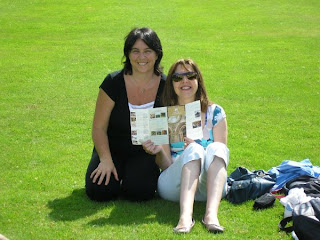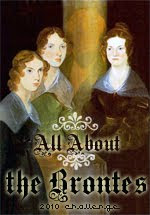Antonella, lunarossa, is Italian but lives in York, England. She is my "oldest" blogger buddy since she was the first to comment and start following Fly High! As it often happens, we discovered we shared several interests. She loves reading and sharing her fondness for books with friends. So, she has decided to give one of her latest best readsaway : Kate Atkinson, "When Will There Be Good News?"
Read what Antonella says about this book in the interview below. To win it you have simply to read and comment this guest post and leave your e-mail address. The giveaway is open worldwide. The winner will be announced next Saturday, 6th March. Good luck to you all!
Now, it's time for you to meet Antonella aka lunarossa
So , Antonella, what do you want to start with?
Hi MG, I don’t really know where to start. I’m a translator/interpreter and owner of a small translation bureau in the North of England. I’m married to an Englishman and I’ve got two children, a boy of 16 and a girl of 10, both bilingual (on the left). They are the loves of my life. I studied foreign languages in Turin, Italy and Bielefeld, Germany where I got my postgraduate certificate in Translation Studies specializing in Law and Mechanical and Civil Engineering. As a kid I wanted to become a doctor and I tried my best to excel in scientific subjects and Latin at school but then my passion for languages got the best of me. My father always says that I chose to study languages as I talk so much than one language only was not enough for me!
Mmm ... Is that why I studied foreign languages, too? My husband would agree with your father but speaking of me , of course! I've never realized. But since I’m also very talkative ... Now, how comes you are Italian and live in York?
Just for love. I met my husband when I was living and working in Germany. It wasn’t love at first sight but we liked each other a lot. We used to hang out together and other friends until I got a job in another German town and we realized we couldn’t be parted. We got married (in Italy) and had our first child in Germany and after that we decided to move to England. As much as we loved Germany we thought it would be quite complicated for our son, he had to cope with three different languages.
What do you most appreciate of your being in England?
Apart from the weather, you mean? Well, I love the English language above all. Its sound, the dialect, the music, the cinema, the theatre, everything that’s got to do with the language. I love going around without being judged how I dress, which car I’ve got, the size of my house, where I come from etc. People don’t judge me and I don’t judge them. I feel free and independent and above all respected.
What do you most miss of Italy?
I miss my mum and dad and my extended family. I don’t have any brothers and sisters but I’ve got lovely cousins with whom I grew up and great friends I’m always in touch with. I miss my best friend Giusy whom I’ve known for 40 years (yes, I’m that old!) and who’s like a sister to me. I miss the weather, of course, and my Piemonte hills and mountains. If you wish to find out more about the place I come from follow THIS LINK
Antonella (on the right with sunglasses) & her best friend , Giusy
I’m a book addict and I’m quite happy to find new books, genres and authors. If I like an author I tend to read everything she/he has written and then I get bored with her/him. So I try to vary the books I read. I also like reading authors from different countries although I’m not always too happy to read books in translation. I like thrillers but they need to be really very good otherwise I get bored. I love historical novels and as I’m a Tudor fan I tend to read everything I can get about that period. In the last few weeks I’ve read a couple of amazing books that I’ve discovered through friends of mine and I’m very happy about it as there’s nothing more frustrating for me than reading a book I don’t like. I consider it a waste of time and I don’t have much spare time. My newest favourite is When Will There Be Good News by Kate Atkison. This is her first book that I have read and I absolutely loved it. The characters are flawed and believable and the plot full of interesting twists and turns. This book kept me up long after I should have been asleep because I couldn't put it down. I really enjoyed it and felt a bit sad when I finished it. Mrs Atkinson will hold a talk in York at the end of March and I will be attending. Looking forward to it.
My most recent books are listed in MY SHELF on anobii.com
My most recent books are listed in MY SHELF on anobii.com
When and Why did you become lunarossa and start blogging?
I followed a few blogs for quite a while and I became blogger friend with a lovely lady called Jeannette (see http://outsidelookingin-jeannette.blogspot.com/ ) and she encouraged to start my own blog, LIVING ABROAD. That was the end of 2008. I’m a sort of outsider blogger as I don't’ fit in any blog category and I write a bit about everything. Mine is not a mummy blog (although I am a mum) or a book blog (although I love books) or a fashion blog (although I like clothes and style), it’s what happens in my life, what I like and all I care for. I chose lunarossa as I love the moon (luna=moon), I’ve been fascinated by it since I was a small child when I used to believe firmly that babies were born on the Moon!!! More trivially, I am very fond of sailing although I cannot afford it here and now, and Lunarossa is also the name of an Italian sailboat syndicate, create to compete for the American Cup in the year 2000.
Many of my visitors are interested in costume movies and dramas. What about you?
As I love history and historical novels, I love period dramas too. I like most of Jane Austen’s adaptations but my absolute favourite is the 1995 BBC miniseries of Pride&Prejudice starring Colin Firth as Mr Darcy. I actually met Colin Firth in 2001 when he was on the set of The Importance of being Earnest, but this is very long story. A wonderful actor and wonderful man.
It was at the time of Bridget Jones Diary. I was a freelance journalist then for a couple of local newspapers and I happened to meet Colin Firth’s agent (she is not his agent any longer). She invited me on set while they were shooting “The Importance of Being Earnest ” and I was lucky enough to meet both Colin Firth and Rupert Everett who granted me an interview. Colin was so handsome in his Jack Worthing’s costume!
Since you were my first regular follower on Fly High, you know about my “one weakness” (aka Richard Armitage). What is your “one weakness”?
Dear MG, One weakness only? I’ve got so many! To mention just a few, George Clooney, Take That, Venice and Nutella!
So full of weaknesses? I can do without Nutella, Venice, Clooney (let’s leave him to his Elisabetta Canalis, if they are still together), Take that ... but leave me my RA daily fix, please!
BTW , have you got any job for me when I decide to stop teaching and move to England? Because I’ll do it, sooner or later, mind you. I’m ready to face snow, ice and rainy weather all over the year. Mmm, maybe I’ll have to think about it some more…
If you can cook, you’re hired as I’m terrible in the kitchen and my family like eating well! Jokes aside, I always need good translators to help me, so if you change your mind….And actually it’s not that rainy and cold here in York. I’ve never experienced such a bad winter here in England before. York and Yorkshire are beautiful, full of natural and historical beauty. There is more to England and Great Britain than London!
Thank you Antonella for being my guest. Your invitation to visit the North of England sounds great. We'll come and visit you and ...Yorkshire. Meanwhile, we'll read abour your life abroad on your blog. Take care!
Just a question for my readers and friends: Who/What is your one weakness? One, please. The one weakness. Something /someone you actually cannot resist. Good luck with the giveaway. Don't forget to add your e-mail address!































.jpg)

















